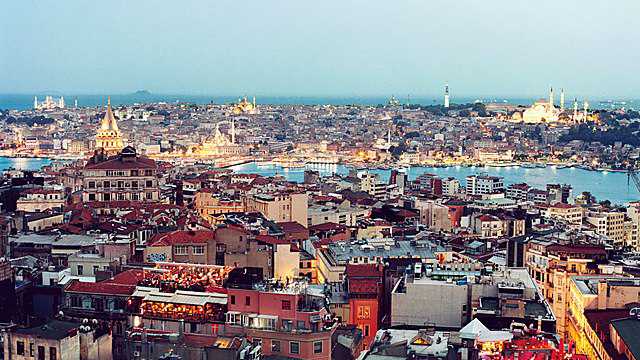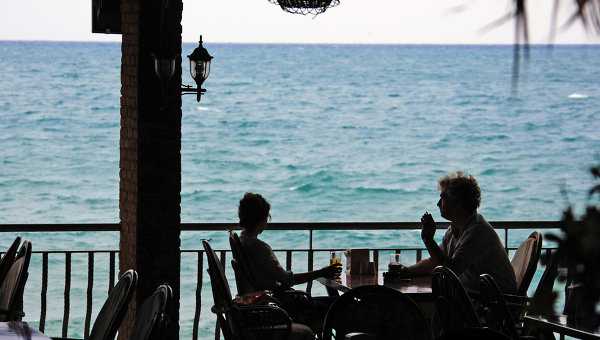The Blind Artist

In what is seen as the first step towards establishing direct trade links between Yerevan and Ankara, a senior Armenian government official has announced his side’s readiness to start supplying electricity to neighboring Turkey as early as next March.
Armen Movsisian, the Minister of Energy and Natural Resources, told reporters on Monday that under the agreement reached between the Armenian and Turkish sides in September, the technical part of the process was to be completed within six months. He added that the export of Armenian electricity to Turkey might begin already on March 1 if Ankara managed to complete all required technical and legal arrangements by that date.
According to Movsisian, the reported rate of infrastructure rehabilitation work shows the Turkish side is well on schedule.
“A few days ago we received information from the Turkish side that the work is in its due course,” the Armenian minister said. “We don’t have any major work to be done on our part and expect to start the export of electricity at the planned time.”
Under the agreement signed between Armenia’s Energy Ministry, the Armenian Electricity Networks CJSC and the Turkish UNIT Company, beginning in early 2009 Armenia is to start supplying 1.5 billion kilowatt per hour of electricity a year, eventually increasing the annual volume of supplies to 3.5 KW/h.
The deal became possible due to the recent fence-mending talks between the leaders of the two estranged nations who thus made the first step towards improving the historically strained Armenian-Turkish relations.
Its announcement came days after the first-ever visit of a Turkish head of state to Armenia. Turkey’s President Abdullah Gul had responded to his Armenian counterpart Serzh Sarkisian’s invitation to attend a World Cup qualifier between the two countries’ soccer teams in Yerevan on September 6, which kick-started a series of high-level meetings between the two countries’ officials believed to pursue the ultimate goal of establishing diplomatic relations, opening the hitherto closed border and promoting direct trade.
The price of supplied electricity, according to Armenian Energy Ministry officials, will be economically effective depending on thermal energy and gas prices. According to current estimates, it may make 5.7 cents per kilowatt.
https://www.azatutyun.am/a/1598523.html

Subject: UDT, supports Prime Minister al-Maliki’s establishment of Support (Isnad) Assemblies and his request for wider legislative authorities.
In the name of the Turkmen associations, movements and committees outside Iraq, UDT, supports Prime Minister al-Maliki’s establishment of Support (Isnad) Assemblies which will strengthen national unity and put an end to the anarchy and chaos in the country.
UDT also supports Prime ministers’ request for wider legislative authorities in order to increase the authority of the central government and get the country under law and order.
Such a move, which gained a great support from the people, in Central and Southern Iraq, is undoubtedly in the interest of the Turkmens who suffered a lot and are still suffering at the hands of the terrorists and separatists. We ask our Turkmen people and its political parties to clearly support the Prime Minister in this great initiative and rally behind him to apply it in the widest scale possible in Turkmeneli and other parts of Northern Iraq.
Since the fall of the dictatorship in Iraq, warlords and thugs, have robbed the country and partitioned it to the level of destruction. Such a people have opposed the Prime Minister in his initiative and threatened to stop him by putting various obstacles in his way.
We as Turkmens around the world would like the Prime Minister to continue in his courageous attempt to unite the country and restore law and order. We are ready to do our best.
Union of Diaspora Turkmens
Executive Board

“THE START OF A NEW ERA IN US-TURKISH RELATIONS”
Date: Tuesday, November 25
Time: 6:00-7:00pm(reception)
7:00-8:00pm (lecture)
Location: Marvin Center
Dorothy Betts Theatre(1st floor)
800 21st Street, NW
Washington, Dc 20015
—
Esra Alemdar
President, GWU TSA
2140 L Street, NW Apt.602
Washington, DC 20037
Tel. (202) 725-0273

| by Taylan Bilgiç
Diminishing global risk appetite bodes ill for developing nations, which, in varying degrees, are dependent on foreign capital inflows to stay afloat. Turkey, like its peers, is also worried foreign investment might dry up, but the latest data and research suggest that might be the least of our problems. The Organization of Economic Cooperation and Development, or OECD, says the “outlook for foreign direct investment, or FDI, has darkened,” in its latest “Investment News” newsletter. Based on current trends, inflows will be down 13 percent and outflows by 6 percent in member countries. There are two reasons for this decline. First, the OECD says, “the freezing of credit markets … have forced companies to rely largely on cash reserves to finance investment. “Many firms are facing severe internal liquidity constraints,” says the Paris-based organization. “Second, with global growth forecast for 2009 at 2.2 percent … the need for companies to invest in new capacity is considerably reduced.” The data suggests Turkey might have much more to fear than just dried-up foreign inflows. In 1999, FDI inflows to developing countries constituted 87 percent of all foreign capital flows, World Bank data show. In contrast, portfolio flows – indirect investment that is relatively quicker to get in and out of countries – accounted for 5 percent. Total inflows that year stood at $204 billion, which means FDI flows stood at $177.5 billion, while portfolio flows were a mere $10.2 billion. Upturned balance As the global crisis unfolds, most of this money is moving back, largely seeking sanctuary in the greenback or U.S. Treasury bonds. But, according to Royal Bank of Scotland estimates – outlined in a note to investors by RBS analyst Timothy Ash – Turkey still has “upwards of $70 billion in foreign portfolio funds invested, which could potentially add to the external financing gap if the situation deteriorates quickly.” And the situation does not seem bright. In the last three months to November, total foreign capital outflows from Turkey reached $16.5 billion, according to estimates by Fortis, outlined in the “Glokal Stratejist” newsletter. That amount includes $6.7 billion in “traditional investment instruments” such as bonds, equities or deposits, while short-term, “hot money” positions were unwound to the amount of $9.8 billion. The total amount of portfolio outflows stood at $5.4 billion just in October, and Fortis says this is “the biggest amount for one month in history.” To put it simply, the question for Turkey is not how much foreign capital it will receive over the next period, but how much foreign capital it will be able to hold. The reluctance of the Central Bank to reduce its overnight borrowing rate – at 16.75 percent – or the silent devaluation of the national currency, seem all tied to this central problem. Thus, ironically, the billions of dollars Turkey has managed to attract in the past six years have become time-bombs now. The possibility of a sudden outflow is why foreign analysts put he figure for Turkey’s external financing need at as high as $120 billion. In a worst-case scenario, such an amount may be barely enough to offset the outflow. In light of this, the ‘negative outlook’ given by S&P to Turkey last week might be a first step in “pricing the Turkish risk” for foreigners. Thus, the pressure on the government to make an extensive deal with the International Monetary Fund increases. |
| 20 Kasım 2008 |

HOW TO DO BUSINESS WITH
NEW YORK CITY & NEW YORK STATE AGENCIES
AGENDA
Wednesday, December 3rd 6-8 PM
Turkish Consulate General
821 United Nations Plaza – 8th Floor New York , NY 10017
6:00 p.m.
Registration & Networking
6:30 p.m.
Opening Remarks
Sevil Ozisik, President –
Turkish-American Chamber of
Commerce & Industry
Prof. Seyhan Erden Arkonac, President – Turkish-American Business Forum
(on behalf of Ms. Arkonac, Murat Agirnasli, former President of TABF)
Begum Dinlenc, President – Turkish Women’s League of America
Welcome
H.E. Mehmet Samsar,
Consul General of Turkey in New York
Program Introduction
Sevil Ozisik, President –
Turkish-American Chamber of
Commerce & Industry
Keynote Moderator
Nermin Ucar, President –
Ultima Construction, Inc.
Agency Participants
Terry Jackson, Managing Director – International Business NYC Global Partners
Office of the Mayor NYC Commission for the United Nations
Consular Corps & Protocol
Michael Garner, Director of Business Development –
NYC Construction Authority
Walter Maxwell, Associate Director of External Affairs –
NYC Small Business Services
Olivia Peck, Assistant Director –
NYS Dormitory Authority
Ida Perich, Manager Business Development – The Port Authority
Of New York / New Jersey
Zenaida Chape, Assistant Director
Outreach Programs – NYC
Metropolitan Transportation Authority
7:15 p.m.
Food, Cocktails & Networking
This is a unique opportunity to learn how to do business with
New York City & New York State Agencies
Sponsorship for this Symposium
Turkish American Chamber of
Commerce & Industry
Turkish-American Business Forum
Turkish Women’s League of America
All proceeds of this event will go to
Ataturk School
When: December 3, 2008 , 6:00 – 8:00 PM
Where: Turkish Consulate General
821 United Nations Plaza – 8th Floor New York , NY 10017
Price: TACCI, TABF & TWLA Members – $35
Non-Members – $45
Please note that RSVP is a must
Please click here to register online, or
RSVP by either emailing to [email protected] or
calling at 646 429 1530 .